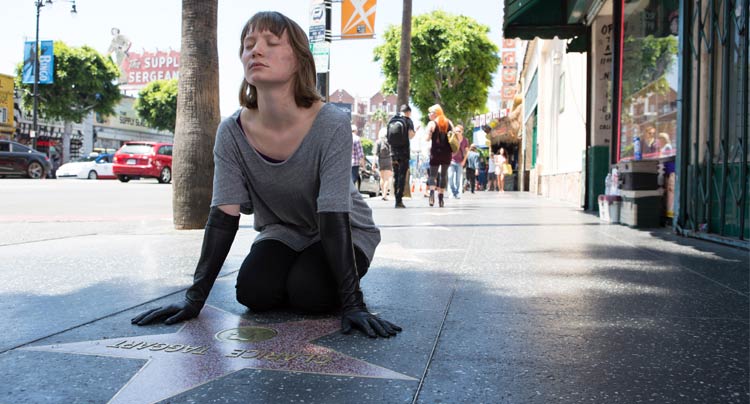
The razor-sharp screenplay is its biggest weapon, but it tends to cut too deep at times with certain lines bordering on cliche.

The razor-sharp screenplay is its biggest weapon, but it tends to cut too deep at times with certain lines bordering on cliche.
Welcome to Hollywood, where you steal spotlights at the age four, go into rehab before you hit puberty, hit menopause by the time you’re 23, and become a desensitized pill-popping, therapy-addicted, fame-crazed relic nearing death by the time you’ve reached your 40s. Oh, should we talk about the abuse? Should we touch upon that jaded little thing called incest? Prepare yourself for one ludicrous look through a cracked magnifying glass stained with cum and shit, one of which is a commodity but I won’t spoil and say which one. This is Cronenbergianism at its absurdest best and excessive worst, and it will most likely end up as the most quotable film competing for this year’s Palme D’Or.
Agatha (Mia Wasikowska) is moving to Hollywood from the Tony Montana land of Florida because her Twitter friend Carrie Fisher (yes, Princess Leia) said she might need help with her new book. Her chauffeur (Robert Pattinson) is one of a myriad actor slash writers looking for that big break. Havana Segrand (Julianne Moore) is an aging actress dangerously close to societal extinction, with all her hopes resting on getting a part in a new Hollywood remake, the same part her mother played in the original 70s version. Her massage therapist is kook guru Stafford Weiss (John Cusack) whose son Benjie (Evan Bird) is a thirteen year old box office megastar recently released from rehab, much to the relief of his mother Christina’s (Olivia Williams) bank account. The rub is that Agatha is the disfigured schizophrenic member of the Weiss family, whose real reason for coming to L.A. is to make amends with her family, who want nothing to do with her because, in a psychotic fit of rage, she tried to murder them all by setting their house on fire.

The symbolism in this film ranges from the stars all the sordid way to the gutter, and thanks to an Angelo Badalamenti-esque score (from Howard Shore!) and some hallucinations, the whole affair plays out like Mulholland Drive‘s long-lost, abused, and dirty half-cousin. All performance are overshadowed by Moore, who is essentially playing it easy for her standards but those standards still make her a strong contender for Best Actress. She steals scene after scene until you realized she’s stealing the whole movie. Wasikowska is officially typecast as the “crazy one”, a role she’s essentially been playing since her breakout turn in HBO’s In Treatment. Pattinson is a complete non-entity, which is in itself a great metaphor for the millions of star reaching non-entities driving limos and busing tables in Hollywood. Everyone else is solid, Cusack and Williams playing it perfectly whacky, and perhaps it’s young Bird who stands out slightly. But one gets the feeling it’s because of the exaggerated role and not so much the performance, fine as it is.
As ever with Cronenberg though, the acting is there as moral support to the more crucial element of theme and screenplay. The corruption depicted in this degenerative society is probably as far from the actual truth as the mention of a real-life celebrity is in the film (they’re mentioned a lot.) The razor-sharp screenplay is its biggest weapon, but it tends to cut too deep at times with certain lines bordering on cliche. Fans of the post-Spder Cronenberg will, I believe, devour every surreal and entertaining moment of Maps To The Stars. For my tastes, the dark humor and the intelligent weaving of violence, fame, and star-mania is enough to make me appreciate it and call it the best film Cronenberg has made since Eastern Promises. The themes of incest, and some of the characters’ fates (not Julianne Moore’s though, that was fantastic) went over the top and made the nightmarish atmosphere too lucid for its own good. All in all though, great fun, and an invigorating addition to Cronenberg’s offbeat filmography.